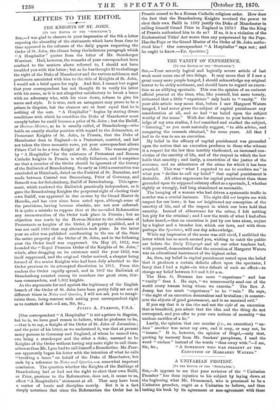LETTERS TO THE EDITOR.
THE KNIGHTS OF ST. JOHN.
[TO THE EDITOR OF TEM"SPECTATOR."]
was glad to observe in your impression of the 8th a letter exposing the absurdity of the statements which have from time to time appeared in the columns of the daily papers respecting the Order of St. John, the climax being the ludicrous paragraph which "A Hospitaller" quotes from the letter of Mr. Storekeeper Warriner. Had, however, the remarks of your correspondent been confined to the matters above referred to, I should not have troubled you with this letter ; but as he has thought fit to challenge the right of the Duke of Manchester and the various noblemen and gentlemen associated with him to the title of Knights of St. John, I would ask a brief space for reply. And first, I cannot but regret that your correspondent has not thought fit to verify his letter with his name, as it is not altogether satisfactory to break a lance with an adversary who, with his vizor down, refuses to give his name and style. It is true, such an antagonist may prove to be a
prince in disguise, but the chances are at least equal that he is nothing of the sort. "A Hospitaller" begins by stating divers conditions with which he considers the Duke of Manchester must comply before he could become a prior of St. John ; but the Bailiff, or Herren-Meister, as he is usually called, of Brandenburg—who holds an exactly similar position with regard to the Johanniter, or Protestant Knights of St. John, in Prussia, that the Duke of Manchester does in England—is a Protestant, married, and has not taken the three monastic vows, yet your correspondent allows Prince Carl to be a true Knight of St. John. The reasons given by "A Hospitaller" for the existence of Protestant and Roman Catholic knights in Prussia is wholly fallacious, and it surprises me that a member of the Order should be ignorant of the history of the Bailiwick of Brandenburg. So early as 1382 a convention was concluded at Heimbach, dated on the Festival of St. Barnabas, and made between Conrad von Braunsberg, Prior of Germany, and Bernedt von der Schulenburg, Bailiff of Brandenburg. This agree- ment, which rendered the Bailiwick practically independent, as it gave the Brandenburg Knights the perpetual right of electing their own Bailiff, was approved in due course by the Grand Master de Heredia, and has ever since been acted upon, although some of the provisions, having become obsolete, are not now enforced. It is quite a mistake to suppose that at the so-called Reformation any reconstruction of the Order took place. in Prussia ; but no objection was made by the Herren-Meister to the admission of Protestants as knights of the Order, if properly qualified, and it was not until 1810 that any alteration took place. In the latter year an edict was published confiscating to the use of the State the entire property of the Order of St. John, and in the following year the Order itself was suppressed. On May 23, 1812, was founded the "Royal Prussian Order of the Knights of St. John," which, after dragging on its existence until the year 1852, was itself suppressed, and the original Order revived, a chapter being formed of the senior Knights who had been duly admitted to the Order previous to its attempted dissolution in 1811. From this nucleus the Order rapidly spread, and in 1867 the Bailiwick of Brandenburg counted among its members one great cross, thir- teen commanders, and 1,802 knights.
As the arguments for and against the legitimacy of the English branch of the Order of St. John have been pretty fully set out at different times in Notes and Queries, I will not ask you to recapi- tulate them, being eontent with setting your correspondent right as to matters of fact.—I am, Sir, &c., JULIUS A. PEARSON, F.S.A.
[Our correspondent "A Hospitaller" is not a prince in disguise, but he is, we have good reason to believe, what he professes to be, —that is to say, a Knight of the Order of St. John of Jerusalem ; and the point of his letter, as we understood it, was that at present many persons in Germany and England, of whom he named two, one being a storekeeper and the other a duke, assumed to be Knights of the Order without having any more right to call them- selves so than Mr. Lyne had to call himself a Benedictine. Mr. Pear- son apparently began his letter with the intention of what he calls "breaking a lance" on behalf of the Duke of Manchester, but ends by a reference to Notes and Queries,—a somewhat impotent conclusion. The question whether the Knights of the Bailliage of Brandenburg had or had not the right to elect their own Bailli, or Prior, previous to the Reformation, does not, it seems to us, affect "A Hospitaller's " statement at all. That may have been a matter of locale and discipline merely. But it is a fact simply notorious that since the Reformation the Order has in Prussia ceased to be a Roman Catholic religious order. How does the fact that the Brandenburg Knights received the power to elect their own Bailli in 1382 justify the Duke of Manchester in calling himself Grand Prior in England in 1870? Has the King of Prussia authorized him to do so? If so, it is a violation of the Ecclesiastical Titles' Act worse than any perpetrated by the Pope. Has the Pope or the Grand Master of the Order of St. John autho- rized him ? Our correspondent "A Hospitaller" says not ; and he ought to know.—ED. Spectator.]






























 Previous page
Previous page